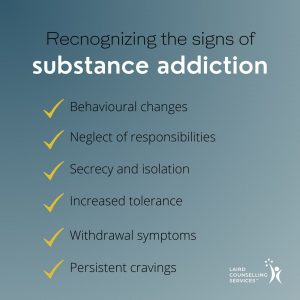 What is substance addiction?
What is substance addiction?
At its core, it involves a compulsive need for drugs or alcohol, often leading to continued use despite adverse consequences. It is usually associated with a psychological as well as physical dependence.![]() Identifying the signs of substance addiction is a crucial step toward intervention and recovery. Keep an eye out for these indicators:
Identifying the signs of substance addiction is a crucial step toward intervention and recovery. Keep an eye out for these indicators:
Behavioral Changes: Sudden shifts in behavior, priorities, and interests.
Neglect of Responsibilities: A decline in fulfilling personal, professional, or social obligations.
Secrecy and Isolation: Attempts to conceal substance use and withdrawing from social connections.
Increased Tolerance: Needing more of the substance to achieve the same effect.
Withdrawal Symptoms: Physical and psychological distress when not using the substance.
Persistent Cravings: Overwhelming urges to engage in substance use.![]() Starting the Conversation:
Starting the Conversation:
Breaking the silence surrounding substance addiction is important. Engaging in open, non-judgmental conversations fosters an environment where individuals feel comfortable seeking help. It’s not just about identifying the issue; it’s about creating a space for understanding and support.![]() Compassionate Support is Key:
Compassionate Support is Key:
If you or someone you know resonates with these signs, remember that help is available. Seeking professional support, whether through a primary care provider, therapy, or support groups, is a courageous step toward a healthier future.
© 2025 Laird Counselling Services & Websites for Therapists by TherapyTribe


